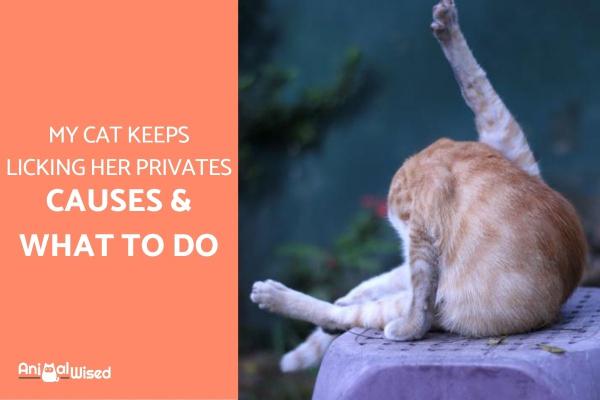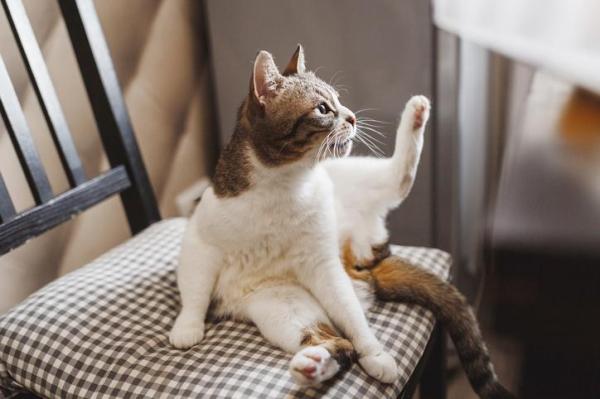My Cat Keeps Licking Her Private Area



See files for Cats
Cats use their tongue in a similar way we use our hands. Not only do they investigate their environment and search for food, but they use it to groom both themselves and other cats. Grooming is an important part of maintaining their well-being and they will lick any part they can reach. Since their genitals can get dirty from excretion and urination, although it may seem unpleasant to us, they will need to lick them to keep clean.
If you have a female cat, you might see that your cat keeps licking her private area. While she will lick her genitals to keep them clean, if we notice they do it more than they should, it could be sign of a problem. At AnimalWised, we understand why a cat keeps licking her privates and what we need to do about it.
Cat licking her privates due to vaginitis
Vaginitis refers to inflammation of the vagina. This can be confused with vulvitis which is the inflammation of the vulva, although both can happen at the same time. This process is where the tissue of the cat's privates becomes inflamed, usually due to a bacterial infection. However, it may be due to the presence of a foreign body, a congenital malformation or even a tumor (whether malign or not).
Among the symptoms of vaginitis/vulvitis is redness, inflammation, mucopurulent secretions and itching. It is the last symptom which cause the cat to keep licking her genitals as she will want to relieve the sensation.
Feline heat cycle
When a cat is in heat, the vulva may become red and swollen. This is not the same as vulvitis, but instead a hormonal trait used to attract a male. In most cases it is imperceptible to us which is why it might be difficult to work out why our cat is licking her genitals.
Our cat, however, will notice the swelling and agitation. When a male has not come to mate her, she will often lick her privates to relieve the frustration of the heat cycle. Read our article all about the heat cycle in cats to identify other symptoms or watch our video below to know more.

Pyometra in cats
Pyometra occurs in the luteal phase of the cat's heat cycle. It causes uterine inflammation, accumulation of purulent secretions and secondary bacterial infection. The hormone progesterone induces uterine glandular hyperplasia and cystic dilation of the cat's uterus. This predisposes the uterus to bacterial growth as it can enter the widened cervix. The hormone also inhibits the cat's immune defenses and contracts the uterine muscles, also increasing risk of infection.
Pyometra is much more frequent in female dogs than female cats since it can only appear if ovulation occurs. Unlike cats, dogs only ovulate when copulation occurs, meaning female cats which don't have access to males will not get pyometra.
Older cats are more susceptible to pyometra. There ar two types of pyometra in cats; open and closed. Closed pyometra is more serious since it results in toxins building up inside the uterus. This can lead to the blood disease septicemia which can be fatal.
The clinical signs of feline pyometra are purulent or bloody from the vulva. If the pyometra is closed, these discharges will not be seen, but there would be fever, lethargy, anorexia, abdominal distention, dehydration and polyuria-polydipsia (they urinate and drink more). The cat will lick their private area with open pyometra, but may not if it is closed.
Metritis in cats
If your cat has recently given birth to a litter of kittens, they may develop metritis. This is an inflammation of the uterus which occurs after labor due to bacteria entering the uterus from the vaginal opening. Since the vagina is stretched to allow birthing, an unsanitary environment may lead to bacteria such as E. coli, streptococci or staphylococci entering.
Metrits most frequently occurs in the first week postpartum and the risk factors for its appearance include complicated deliveries, obstetric manipulation, fetal death and retention of the placenta. In addition to licking the vulva, a cat with metritis will present fever, lethargy, anorexia or bloody vaginal discharge after giving birth. They may also reject her kittens.
Feline lower urinary tract disease (FLUTD)
Despite the name, feline lower urinary tract disease is actually a range of different pathologies which can affect their urinary tract. They are grouped together as they share certain characteristics and symptoms such as pain when urinating, blood in their urine and irritation to the genitals. This is why FLUTD is one of the reasons why cats keep licking their privates.
The most common causes of FLTUD are feline idiopathic cystitis, urinary stones and urethral obstructions. Less common causes include bacterial cystitis, anatomical defects and tumors.
Feline idiopathic cystitis is a pathology that causes inflammation in the wall of the bladder of a cat. It is closely related to stress our feline may experience. It can be non-obstructive or obstructive, requiring emergency treatment. It is a disease that is diagnosed by exclusion, that is, once other causes have been ruled out.
Urinary stones (uroliths) in cats are usually struvite or calcium oxalate. They can cause acute kidney disease and hydronephrosis. Older, obese and inactive cats are more predisposed to its development. The best prevention of urinary stones is to encourage hydration in our cats, prevent them from becoming obese and try to increase their activity.
Trauma
Although the above causes are the most common reasons a cat licks her private parts, it can also be due to physical trauma. This is when a bump, scratch or any wound appears on their genitals. Secondary bacterial infection or the trauma itself causes the genitals to be irritated, swollen and/or bleeding. This will cause the cat to increase licking of the area.

What to do if my cat keeps licking her privates?
If your cat licks her vulva frequently, it can be due to something minor and temporary or something serious which requires emergency treatment. We need to take them to a veterinarian for an accurate diagnosis in case it is the latter, even if it turns out to be relatively benign. Only they can accurately diagnose the problem and provide the correct course of treatment. The treatment they prescribe may include:
- In cases of vulvitis, vulvovaginitis and vaginitis, antibiotics will be administered to fight the bacterial infection. Anti-inflammatories may also be prescribed, especially if the cat is in pain.
- In cases of postpartum metritis, drugs such as prostaglandin F2alpha or cloprostenol may be administered, although it is not recommended in very sick cats. Broad-spectrum antibiotics and fluid therapy will be necessary before subjecting them to any medical treatment or sterilization after weaning. If the cat is very weak and rejects the kittens, the kittens should be bottle-fed and weaned by hand.
- Closed pyometra needs emergency care, with stabilization of the cat and sterilization as soon as possible. In open pyometra, if the cat is not going to reproduce again, sterilization must be carried out after they have been treated with fluids, antibiotics, antiprogesterone or prostaglandins.
This article is purely informative. AnimalWised does not have the authority to prescribe any veterinary treatment or create a diagnosis. We invite you to take your pet to the veterinarian if they are suffering from any condition or pain.
If you want to read similar articles to My Cat Keeps Licking Her Private Area, we recommend you visit our Reproductive system diseases category.
- Angle, S. M. (2013). Reproduction in canine and feline neonatology. SERVET.
- Harvey, A., & Tasker, S. (Eds). (2014). Feline Medicine Manual. Ed. Sastre Molina, SL L ́Hospitalet de Llobregat, Barcelona, Spain.






